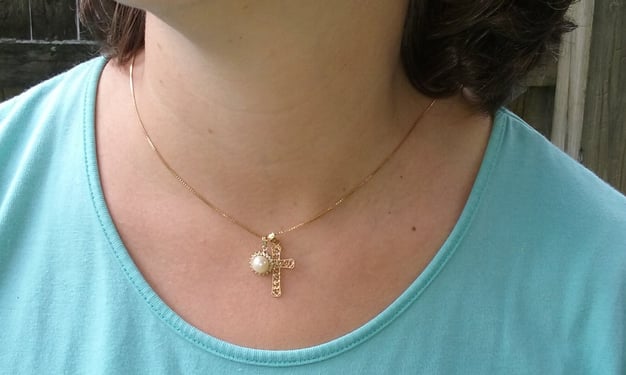I never understood the parable of the pearl of great price until just recently. Why would a merchant sell all that he had in order to buy a single pearl, no matter how valuable? It contradicts the cardinal rule of investing: diversify your holdings. It conflicts with the commonsense rule of life: don't put all your eggs in one basket. It doesn't make rational sense.
Then one day, my whole perspective changed as a result of a casual encounter on the beach. I was introduced to Marian, an extended family member. As Marian and I stood on the sand exchanging pleasantries, a ray of sunlight glinted off the necklace I was wearing. "Oh," exclaimed Marian, "a pearl!" I explained that my husband had given me the pendant as an anniversary present, celebrating many years and many children together. Grinning, she remarked, "Your marriage is a pearl of great price."
Her words made the incomprehensible parable comprehensible. When I married my husband and promised to forsake all others, I gave away all that I was and all that I had. When I vowed to stay true for richer, for poorer, in sickness and in health, I (metaphorically) placed my eggs in one basket. I risked everything, and I made the right choice -- an irreversible one.
Marriage has no back-up plan, no escape hatch, no termination clause. Marriage is permanent, and the commitment to love our spouse is everlasting. We risk everything in the hopes of gaining everything. We sell everything in order to buy a pearl of great price.
This element of risk may make marriage vows seem rash. But every vow, every promise of future behavior, is dangerously uncertain. As G.K. Chesterton wrote:
The man who makes a vow makes an appointment with himself at some distant time or place. The danger of it is that himself should not keep the appointment. And in modern times this terror of one's self, of the weakness and mutability of one's self, has perilously increased and is the real basis of the objection to vows of any kind. ... It is exactly this backdoor, this sense of having a retreat behind us, that is, to our minds, the sterilizing spirit of modern pleasure.
What makes a vow sane, according to Chesterton, is the "transfiguring self-discipline" that leads a man to promise great things and never give up fighting to achieve them. But a vow is not only risky because of our own weakness and mutability. It's also risky in light of any weakness in the other person. Can we trust our partner to keep his or her own vow? What if the "pearl" turns out to be flawed or, worse yet, counterfeit?
Let's return to the parable. In Jesus' allegorical story, the pearl of great price represents the kingdom of heaven. As people of faith, we can be certain that heaven is never counterfeit and that God's perfect love is real and eternal. On a human level, marriage does not have the same degree of certainty. All human beings have flaws, some big and some small. One of those flaws is the tendency to overemphasize other's imperfections while minimizing our own. We suspect, when sorrow comes, that we've somehow been cheated out of our just due.
But sacramental marriage is more than a merely human endeavor. A sacramental marriage has God in the midst of it. It is a path to heaven, a way of achieving holiness in the world, a vocation of service to which we are called by God. By entering into a sacramental marriage, we don't just risk everything we have for the sake of another human being -- we risk everything for God. And, when all is said and done, that's always a good bet.
Text and photo copyright 2015 Karee Santos. All rights reserved.
About the Author

Guest
We welcome guest contributors who graciously volunteer their writing for our readers. Please support our guest writers by visiting their sites, purchasing their work, and leaving comments to thank them for sharing their gifts here on CatholicMom.com. To inquire about serving as a guest contributor, contact editor@CatholicMom.com.



.png?width=1806&height=731&name=CatholicMom_hcfm_logo1_pos_871c_2728c%20(002).png)
Comments